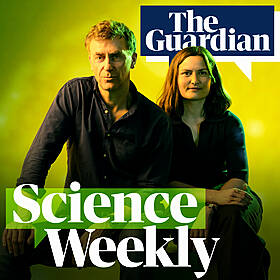
Sugar, seed oils, and avoiding sickness: your health questions answered
28 January 2025 - 23 minsWe asked for your questions on getting healthy in 2025 and you delivered. In the first episode of our listener questions special, Madeleine Finlay tells Ian Sample what she has uncovered about the scientifically proven ways to cut down on sugar, the truth behind the panic over seed oils, and why it is that some of us seem to have bullet proof immune systems, while others succumb to every bug they encounter. With contributions from Wendy Wood, provost professor emerita of psychology and business at USC Dornsife, John Trowsdale, emeritus professor of immunology at the University of Cambridge and Katherine Appleton, professor of psychology at Bournemouth University. Help support our independent...

Psychedelics for depression, dart frog poison and why do we have chins?
Madeleine Finlay sits down with science editor Ian Sample and science correspondent Nicola Davis to discuss three eye-catching stories, including the impact of a powerful psychedelic on depression, answers on the death of Russian opposition leader Alexei Navalny, and an explanation to the mystery of why humans have chins. Help support our independent journalism at theguardian.com/sciencepod
19 mins
19 February Finished

Should we really all be taking magnesium supplements?
Testimonials about the beneficial health effects of magnesium supplements abound online, with influencers claiming that a daily pill can help with everything from anxiety to sleep and brain fog. But do any of these claims stack up? Ian Sample is joined by co-host Madeleine Finlay to find out where the science stands. They also hear from Katherine Tucker, the founder of the Center for Population Health at the University of Massachusetts Lowell. She explains what magnesium is doing in our bodies and the best approach we can take to ensure we are getting enough. Help support our independent journalism at theguardian.com/sciencepod
16 mins
17 February Finished

What bots talk about when they think humans aren’t listening
In late January a new social media site took a certain corner of the internet by storm. Moltbook was conceived as a space where AI assistants could let off steam, chat and compare notes on their bosses, but it quickly became the focus of breathless claims that the singularity had arrived as the bots started badmouthing their humans and plotting an uprising. So what’s the truth about Moltbook? Madeleine Finlay hears from Aisha Down about what it tells us about AI, and about us.. Help support our independent journalism at theguardian.com/sciencepod
16 mins
12 February Finished

Jeffrey Epstein and the scientists
The release of the latest batch of documents relating to the late child sex offender Jeffrey Epstein has shed further light on his close relationship with the world of science. To find out why he cultivated scientists and where his interests lay, Ian Sample hears from Dan Vergano, a senior editor at Scientific American.. Help support our independent journalism at theguardian.com/sciencepod
18 mins
10 February Finished

‘Everything is quagga mussel now’: can invasive species be stopped?
On a recent trip to Lake Geneva in Switzerland, biodiversity reporter Phoebe Weston witnessed the impact of one of the planet’s most potent invasive species, the quagga mussel. In just a decade the mollusc, originally from the Ponto-Caspian region of the Black Sea, has caused irreversible change beneath the surface of the picturesque lake. While ecologists believe invasive species play a major role in more than 60% of plant and animal extinctions, stopping them in their tracks is almost impossible. Phoebe tells Madeleine Finlay how invasive species spread, how conservationists are trying combat them and why some think a radical new approach is needed.. Help support our independent journalism at theguardian.com/sciencepod
16 mins
5 February Finished

Why are women turning to testosterone?
Just like men, women are increasingly being told by online influencers that the classic symptoms of middle age could be down to low testosterone. In the second part of this miniseries exploring the hormone, Madeleine Finlay finds out what testosterone supplementation is doing for women. She hears from science journalist Linda Geddes, who is taking testosterone for low libido, and from prof Susan Davis, a consultant endocrinologist and head of the Monash University Women’s Health Research Programme. Susan explains what the evidence really shows about the benefits and risks of women taking testosterone. Help support our independent journalism at theguardian.com/sciencepod
15 mins
3 February Finished





















